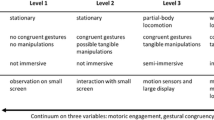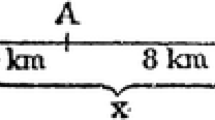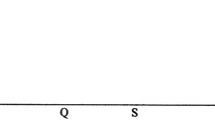Abstract
In this paper we analyze, from the perspective of 'Embodied Cognition', why learning and cognition are situated and context-dependent. We argue that the nature of situated learning and cognition cannot be fully understood by focusing only on social, cultural and contextual factors. These factors are themselves further situated and made comprehensible by the shared biology and fundamental bodily experiences of human beings. Thus cognition itself is embodied, and the bodily-grounded nature of cognition provides a foundation for social situatedness, entails a reconceptualization of cognition and mathematics itself, and has important consequences for mathematics education. After framing some theoretical notions of embodied cognition in the perspective of modern cognitive science, we analyze a case study – continuity of functions. We use conceptual metaphor theory to show how embodied cognition, while providing grounding for situatedness, also gives fruitful results in analyzing the cognitive difficulties underlying the understanding of continuity.
Similar content being viewed by others
References
Brooks, R. and Stein, L. A.: 1993, Building Brains for Bodies, A.I. Memo No. 1439. Massachusetts Institute of Technology. Artificial Intelligence Laboratory.
Cobb, P.: 1994, 'Where is the mind? Constructivist and sociocultural perspectives on mathematical development', Educational Researcher 23(7), 13–20.
Cobb, P., Yackel, E. and Wood, T.: 1992, 'A constructivist alternative to the representational view of mind', Journal for Research in Mathematics Education 23(1), 2–33.
Collins, A., Brown, J.S. and Newman, S.: 1989, 'Cognitive apprenticeship: Teaching students the craft of reading, writing, and mathematics', in L.B. Resnick (ed.), Knowing, Learning, and Instruction: Essays in Honor of Robert Glaser Erlbaum, Hillsdale, NJ, pp. 453–494.
Confrey, J.: 1990, 'A review of the research on student conceptions in mathematics, science, and programming', in C. Cazden (ed.), Review of Research in Education, 16, American Educational Research Association, Washington, DC, pp. 3–56.
Confrey, J.: 1995, 'A theory of intellectual development', For the Learning of Mathematics 15(1), 38–48.
Csordas, T.J.: 1994, Embodiment and Experience: The Existential Ground of Culture and Self, University Press, Cambridge.
DiSessa, A, 1983, 'Phenomenology and the evolution of intuition', in D. Gentner and A. Stevens (eds.), Mental Models, Erlbaum, Hillsdale, NJ, pp. 15–33.
Edelman, G.: 1992, Bright Air, Brilliant Fire, Basic Books, New York.
Edwards, L. and Núñez, R.: 1995, 'Cognitive science and mathematics education: A non-objectivist view', Proceedings of the 19th conference of the international group for the psychology of mathematics education, PME. Vol. 2, pp. 240–247.
Eysenk, M. and Keane, M.: 1992, Cognitive Psychology: A Student's Manual, Erlbaum, London.
Feldman, J., Lakoff, G., Bailey, D., Narayanan, S., Regier, T. and Stolcke, A.: 1996, 'L0 — The first five years of an automated language acquisition project', Artificial Intelligence Review 10(1).
Gardner, H.: 1985, The Mind's New Science, Basic Books, New York.
Greeno, J.: 1997, 'On claims that answer the wrong questions', Educational Researcher, 26, 5–17.
Johnson, M.: 1987, The Body in the Mind, University of Chicago Press, Chicago.
Kitcher, P.: 1997, April, Personal communication, University of California at San Diego.
Lakoff, G.: 1987, Women, Fire and Dangerous Things: What Categories Reveal about the Mind, University of Chicago Press, Chicago.
Lakoff, G.: 1993, 'The contemporary theory of metaphor', in A. Ortony (ed.) Metaphor and Thought, Cambridge, Cambridge University Press, Cambridge, pp. 202–251.
Lakoff, G. and Johnson, M.: 1980, Metaphors we Live by, University of Chicago Press, Chicago.
Lakoff, G. and Johnson, M.: 1998, Philosophy in the Flesh, Basic Books, New York.
Lakoff, G. and Núñez, R., 1997, 'The metaphorical structure of mathematics: Sketching out cognitive foundations for a mind-based mathematics', in L. English (ed.), Mathematical Reasoning: Analogies, Metaphors, and Images, Erlbaum, Hillsdale, NJ, pp. 21–89.
Lakoff, G. and Núñez, R.: forthcoming, Where Mathematics Comes From: How the Embodied Mind Creates Mathematics.
Lave, J.: 1988, Cognition in Practice: Mind, Mathematics and Culture in Everyday Life, Cambridge University Press, Cambridge.
Lave, J. and Wenger, E.: 1991, Situated Learning: Legitimate Peripheral Participation, Cambridge University Press, Cambridge.
Lock, M.: 1993, 'Cultivating the body: Anthropology and epistemologies of bodily practice and knowledge', Annual Review of Anthropology 22, 133–155.
Maturana, H. and Varela, F.: 1987, The Tree of Knowledge: The Biological Roots of Human Understanding, New Science Library, Boston.
Merleau-Ponty, M.: 1945, La Phénoménologie de la Perception, Gallimard, Paris.
Nunes, T. and Bryant, P.: 1996, Children Doing Mathematics, Blackwells, Cambridge, MA.
Núñez, R.: 1993, En deçà du transfini: Aspects psychocognitifs sous-jacents au concept d'infini en mathématiques, University Press, Fribourg, Switzerland.
Núñez, R.: 1995, 'What brain for God's-eye? Biological naturalism, ontological objectivism, and searle', Journal of Consciousness Studies 2(2), 149–166.
Núñez, R.: 1997, 'Eating soup with chopsticks: Dogmas, difficulties, and alternatives in the study of conscious experience', Journal of Consciousness Studies 4(2), 143–166.
Núñez, R. and Lakoff, G.: 1998, 'What did weierstrass really define? The cognitive structure of natural and ε — δ continuity', Mathematical Cognition 4(2), 85–101.
Pierpont, J.: 1899, 'On the arithmetization of mathematics', Bulletin of the American Mathematical Society, 394–406.
Regier, T.: 1996, The Human Semantic Potential, MIT Press, Cambridge, MA.
Robert, A.: 1982, 'L'acquisition de la notion de convergence de suites numériques dans l'enseignement supérieur', Recherches en didactique des mathématiques, 3, 307–341.
Rogoff, B.: 1990, Apprenticeship in Thinking: Cognitive Development in Social Context, Oxford University Press, Oxford.
Rogoff, B. and Lave, J. (eds.): 1984, Everyday Cognition: Its Development in Social Context, Harvard University Press, Cambridge, MA.
Rosch, E.: 1973, 'Natural categories', Cognitive Psychology 4, 328–350.
Rosch, E., 1994, 'Categorization', in V.S. Ramachandran (ed.), The Encyclopedia of Human Behavior, Academic Press, San Diego, CA.
Sanford, A.: 1985, Cognition and Cognitive Psychology, Basic Books, New York.
Simmons, G.F.: 1985, Calculus with Analytic Geometry, McGraw-Hill, New York.
Smith, J.P, diSessa, A. and Roschelle, J.: 1993/94, 'Misconceptions reconceived: A constructivist analysis of knowledge in transition', Journal of the Learning Sciences 3(2), 115–163.
Tall, D.O. and Vinner, S.: 1981, 'Concept image and concept definition in mathematics with particular reference to limits and continuity', Educational Studies in Mathematics 12, 151–169.
Talmy, L.: 1988, 'Force dynamics in language and cognition', Cognitive Science, 12(1), 49–100.
Thelen, E. and Smith, L.: 1994, A Dynamic Systems Approach to the Development of Cognition and Action, MIT Press, Cambridge, MA.
Varela, F., Thompson, E. and Rosch, E.: 1991, The Embodied Mind: Cognitive Science and Human Experience, MIT Press, Cambridge, MA.
Von Glasersfeld, E.: 1990, 'An exposition of constructivism: Why some like it radical', in R. Davis, C. Maher and N. Noddings (eds.), Constructivist Views on the Teaching and Learning of Mathematics, National Council of Teachers of Mathematics, Reston, VA.
Walkerdine, V.: 1982, 'From context to text: A psychosemiotic approach to abstract thought', in M. Beveridge (ed.), Children Thinking through Language, Edward Arnold, London.
Author information
Authors and Affiliations
Rights and permissions
About this article
Cite this article
Núñez, R.E., Edwards, L.D. & Filipe Matos, J. Embodied cognition as grounding for situatedness and context in mathematics education. Educational Studies in Mathematics 39, 45–65 (1999). https://doi.org/10.1023/A:1003759711966
Issue Date:
DOI: https://doi.org/10.1023/A:1003759711966




